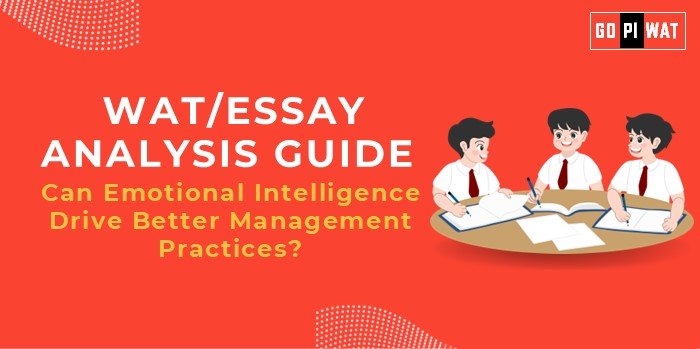📋 WAT/Essay Analysis Guide
🌟 Topic: Understanding Emotional Intelligence’s Importance
🌐 Significance of Emotional Intelligence
Emotional intelligence (EI) bridges the gap between technical expertise and effective people management, making it crucial for thriving in corporate leadership. B-schools emphasize EI due to its significant role in enhancing leadership capabilities, team collaboration, and strategic decision-making.
🕒 Effective Planning and Writing
- Time Allocation: Planning (5 minutes) | Writing (20 minutes) | Review (5 minutes)
- Preparation Tips:
- Use verified data (e.g., 90% of top performers have high EI).
- Highlight global case studies, such as Google’s leadership programs.
✍️ Introduction Techniques for Essays
- Contrast Approach: “While technical skills ensure short-term success, emotional intelligence determines long-term leadership impact, fostering strong relationships and resilient teams.”
- Solution-Based Approach: “Incorporating emotional intelligence into management practices can resolve communication barriers, improve decision-making, and create productive workplaces.”
- Timeline Approach: “Since Daniel Goleman popularized emotional intelligence in the 1990s, its relevance has grown, particularly in modern leadership roles that demand adaptability and empathy.”
📖 Structuring the Essay Body
Achievements:
“Leaders with high EI enhance communication, inspire teams, and achieve up to 31% higher productivity (Gallup, 2023).”
Challenges with Comparative Analysis:
“Measuring EI remains subjective, unlike IQ. However, companies like Microsoft overcome this by embedding EI training in leadership development programs.”
Future Outlook:
“The integration of AI tools and psychometric evaluations will make EI measurable, enabling organizations to develop emotionally intelligent leaders.”
📄 Concluding Effectively
- Balanced Perspective: “While emotional intelligence alone cannot guarantee managerial success, its integration with technical skills fosters holistic leadership, driving organizational growth.”
- Global Comparison: “Countries like Japan emphasize emotional harmony in leadership, aligning with EI principles that promote workplace collaboration.”
📊 Analyzing Successes and Shortcomings
- Key Achievements: Boosts leadership, employee engagement, and conflict resolution.
- Ongoing Challenges: Subjectivity in measurement and cultural differences.
- Global Context: Case studies like Google and PepsiCo demonstrate successful EI implementation.
✅ Recommendations for Sustainable Progress
- Implement EI training in corporate leadership programs.
- Integrate measurable EI tools for performance assessments.
- Foster a culture of empathy and active listening within organizations.
📝 Sample Short Essays
- Balanced Perspective: “Emotional intelligence is a critical tool for modern managers, enhancing leadership and team productivity. However, its success lies in balancing emotional insight with strategic expertise, creating well-rounded leaders.”
- Solution-Oriented: “To drive better management, organizations must integrate emotional intelligence training, enabling leaders to build trust, resolve conflicts, and inspire teams effectively.”
- Global Comparison: “While emotional intelligence drives managerial success in the US and Japan, its integration with technical skills is essential for global leadership roles in diverse and dynamic markets.”


